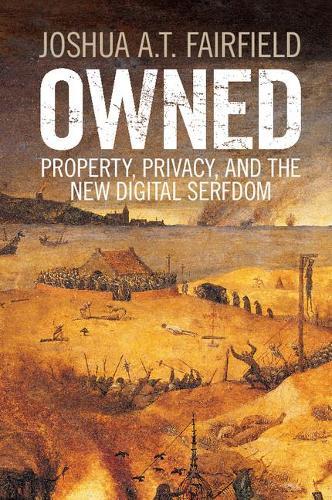Overview
In this compelling examination of the intersection of smart technology and the law, Joshua A. T. Fairfield explains the crisis of digital ownership - how and why we no longer control our smartphones or software-enable devices, which are effectively owned by software and content companies. In two years we will not own our 'smart' televisions which will also be used by advertisers to listen in to our living rooms. In the coming decade, if we do not take back our ownership rights, the same will be said of our self-driving cars and software-enabled homes. We risk becoming digital peasants, owned by software and advertising companies, not to mention overreaching governments. Owned should be read by anyone wanting to know more about the loss of our property rights, the implications for our privacy rights and how we can regain control of both.
Full Product Details
Author: Joshua A. T. Fairfield
Publisher: Cambridge University Press
Imprint: Cambridge University Press
Dimensions:
Width: 15.20cm
, Height: 1.40cm
, Length: 22.80cm
Weight: 0.390kg
ISBN: 9781316612200
ISBN 10: 1316612201
Pages: 256
Publication Date: 10 July 2017
Audience:
Professional and scholarly
,
Professional & Vocational
Format: Paperback
Publisher's Status: Active
Availability: Manufactured on demand

We will order this item for you from a manufactured on demand supplier.
Reviews
Advance praise: 'Property in the digital age is getting strange. You can own things you can't see or touch, like Bitcoins. But your ownership of things you can, like your car and your phone, has never been less secure. Owned is an essential guide to how not to get owned by the things you think you own.' James Grimmelmann, Cornell University, New York Advance praise: 'The transition from an economy built around physical goods to one premised on the exchange of information presents profound challenges for traditional notions of personal property. Nothing less than our autonomy, security, and privacy are at stake. In Owned, Fairfield illuminates the path forward for property. He offers a powerful theoretical vision and a set of practical reforms that could help us restore control over our digital futures.' Aaron Perzanowski, co-author of The End of Ownership: Personal Property in the Digital Economy Advance praise: 'The Internet of Things presents new threats to liberty. You don't own your front door; the company running its software does. Fairfield tells us how law needs to change to protect our ancient rights of ownership over the things we buy.' Edward Castronova, Indiana University, Bloomington
Advance praise: 'Property in the digital age is getting strange. You can own things you can't see or touch, like Bitcoins. But your ownership of things you can, like your car and your phone, has never been less secure. Owned is an essential guide to how not to get owned by the things you think you own.' James Grimmelmann, Cornell University, New York Advance praise: 'The transition from an economy built around physical goods to one premised on the exchange of information presents profound challenges for traditional notions of personal property. Nothing less than our autonomy, security, and privacy are at stake. In Owned, Fairfield illuminates the path forward for property. He offers a powerful theoretical vision and a set of practical reforms that could help us restore control over our digital futures. Aaron Perzanowski, co-author of The End of Ownership: Personal Property in the Digital Economy Advance praise: 'The Internet of Things presents new threats to liberty. You don't own your front door; the company running its software does. Fairfield tells us how law needs to change to protect our ancient rights of ownership over the things we buy.' Edward Castronova, Indiana University
Author Information
Joshua A. T. Fairfield is a Professor of Law at Washington and Lee University, Virginia. He is an internationally recognized law and technology scholar of digital property, electronic contract, big data privacy, and virtual communities. He has published articles in top law journals, as well as The New York Times, Forbes and the Financial Times. In 2012–13 he was awarded a Fulbright Grant to study trans-Atlantic privacy law.




